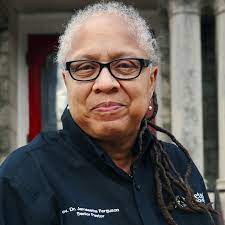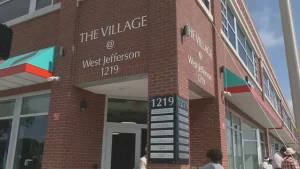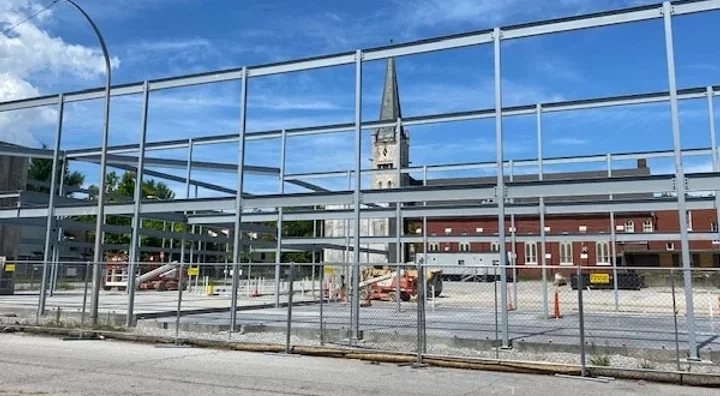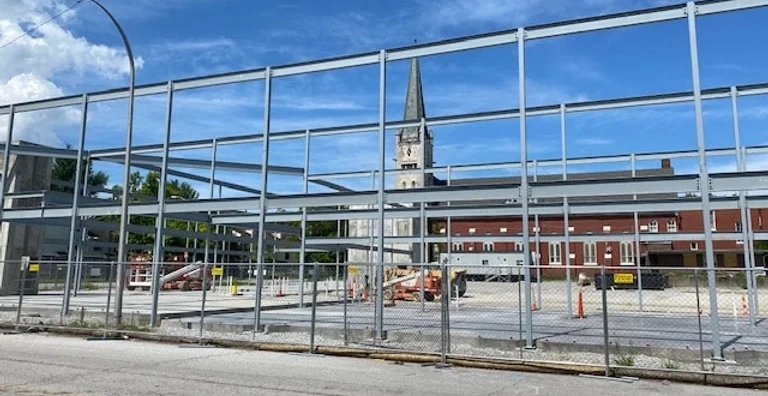Churches cannot remain places solely dedicated to worship and congregational fellowship if they are to answer the calling to serve their neighbors, United Church of Christ minister and activist Jamesetta Ferguson said during the 2022 Coldwell Lectures at Louisville Presbyterian Theological Seminary in Kentucky.
Urban congregations, especially, must move beyond comfort zones to develop “practical and tangible” ministries tailored to the unique needs of local communities, said Ferguson, senior pastor of St. Peter’s United Church of Christ and president of MOLO Village, a stand-alone community development corporation that serves West Louisville’s Russell neighborhood.

Jamesetta Ferguson
“I believe Jesus was in the streets. He wasn’t necessarily in the church. I think Jesus was a community organizer who spent most of his life among people and supporting those around him,” said Ferguson, a Louisville Seminary alumnus.
Ministries focused outside the four walls of the church make congregations more attractive to young people, she added during the Nov. 10 hybrid event broadcast on YouTube. “I talk to young people all the time and what they say is, ‘We want to see Jesus at work. We don’t only want to hear about Jesus, want to see Jesus at work in our community.’”
Ferguson devoted her lecture to describing the emergence and mission of Molo Village CDC from early days as a ministry of St. Peter’s UCC.
She explained that St. Peter’s UCC was a historic, all-white, elderly congregation when she arrived as its first African American pastor in 2006. It took the membership some time to adjust. “One of them said, ‘I’m not going to worship with somebody who looks like you.’”
“This church was invisible to the people in its community. They considered themselves a lighthouse in the community, but the community was not in the church.”
But residents in the mostly Black neighborhood, where 80% of households earned less than $15,000 annually at the time, thought much the same about the stately church and its closed-off members, she said. “This church was invisible to the people in its community. They considered themselves a lighthouse in the community, but the community was not in the church.”
Six months of “sacred conversations” helped St. Peter’s membership see and respond to a calling to change that posture, Ferguson said. “We opened the doors of the church. People wanted help. They wanted to be in the church. They wanted a spiritual connection, but they also needed that missional connection.”
St. Peter’s developed ministries based on Matthew 25 and was soon “serving 750 to 1,000 people a week because we were determined to provide services to people where they needed that service,” Ferguson said. “It wasn’t what we wanted them to have, it is what they needed.”
The approach also included a “pick up your bed and walk” principle that urged individuals to help themselves when possible.
“Part of our responsibility, not only as the church but as community organizers, is to help people to understand … they have some responsibility to do some things for themselves,” she noted. “And it’s our responsibility to help them, to encourage them and perhaps mentor them so that they have the strength to live as the people who God has called them to be.”
In time, the ministry’s growth necessitated creation of a separate community development corporation capable of seeking grants, expanding services and gaining the buy-in of the wider business and residential community. MOLO, a South African word for “welcome,” was launched.
 “MOLO is a grassroots operation helping the people of Russell to organize community power,” Ferguson said. “We listen to the community stakeholders to determine what they want, not what we want for them. They have a voice. That’s important because if they have a voice, they take ownership and of what happens in their community.”
“MOLO is a grassroots operation helping the people of Russell to organize community power,” Ferguson said. “We listen to the community stakeholders to determine what they want, not what we want for them. They have a voice. That’s important because if they have a voice, they take ownership and of what happens in their community.”
The operation offers numerous services, including an activity center and nutrition and exercise programs for seniors, leadership development, after-school and employment opportunities for youth, and programs to help those in recovery reintegrate into the community.
One of its biggest projects is The Village @ West Jefferson, a 30,000 square-foot, mixed-use commercial development with tenants ranging from restaurants to health care and property management companies. The facility, which opened in July 2021, has generated nearly 250 living-wage jobs and is bringing an estimated $25 million of revenue into the community, Ferguson said.
“When we started this project … there were so many naysayers out there that said, ‘Who wants to go west of Ninth Street? Who’s going to invest in this project?’ And the answer is there were a lot of people who were willing to invest in this $7.8 million investment.”
But organizers also had the power of missional ministry behind them for this and other aspects of the community development corporation, she said. “Our people need hope that their lives can be better, that their families can be better, that their situations can improve, that they can prosper and once again become who God has called them to be.”
Other congregations can adopt the same approach, Ferguson said. “Churches are not just places of worship, but places where people can come to get their needs met, or they can come and use the church to benefit the community.”
Related articles:
Survey says: More than half of U.S. congregations started new ministries during COVID
7 dos and don’ts when considering the redevelopment of church property | Opinion by Rick Reinhard


